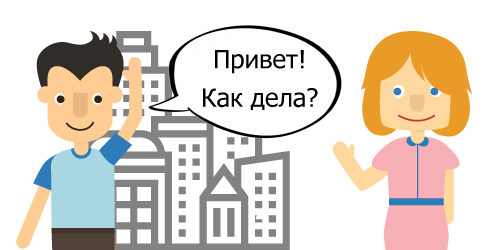
Russian course
Basic Russian for beginners
Lesson 1:
Hello, how are you?
In this lesson you will learn:
- How to say hello to a friend.
- Basic rules of the verb "to be" in the Present tense.
- Basic rules about the gender of nouns.
Welcome to our online course on the Russian language. We have created 14 lessons for you to discover this wonderful language so you can have a basic first contact. In other words, you won't find long lessons with never-ending grammar sections here. We touch on a variety of aspects of the Russian language, which gives you a general understanding in a short period. Russian has grammatical concepts which might be non-existent in your native language. We'll introduce them briefly, so you get to know them without having to read long explanations.

Useful phrase in Russian
Listen and repeat the following sentence:
Приве́т, как дела́?
pri-vyét, kak dye-Lá?
Hi, how are you?
Приве́т is an informal greeting equivalent of our "hi". It is used when meeting friends.
Как дела́? is the short form of "как твои́ дела́?" (literally "how (are) your things?"). It's an informal question used with friends.

Russian vocabulary
Read, listen and repeat the basic vocabulary of this lesson:
In every lesson you'll find a short list with new words. You don't need to memorize them now, because later in the lesson you are going to listen to dialogues which contain this new vocabulary. At the end of the this course you'll have learnt more than 200 Russian words, which is enough to have a basic conversation. Listen carefully to the pronunciation and repeat each word.
English
Russian
Pronunciation
Hi
Приве́т
pri-vyét
Russian (masculine)
Ру́сский
rús-kij
Russian (feminine)
Ру́сская
rús-kaya
Yes
Да
da
No
Нет
nyet
I
Я
ya
You
Ты
ty

Dialogues in Russian
These dialogues will help you memorise this lesson's vocabulary:
Dialogue 1
English
Russian
Pronunciation
Hi!
Приве́т!
pri-vyét.
Hi! How are you? I (am) Elena, and you?
Приве́т! Как дела́? Я - Еле́на, а ты?
pri-vyét. kak dye-Lá? Ya ye-lyé-na, a ty?
And I (am) Michael.
А я Майкл.
a ya maj-kl.
(Are) you Russian?
Ты ру́сский?
ty rús-kij
No, and you?
Нет, а ты?
nyet a ty?
Yes, I (am) Russian.
Да, я ру́сская.
da ya rus-ka-ya
Dialogue 2
English
Russian
Pronunciation
(Are) you Russian?
Ты ру́сская?
Ty rús-ka-ya?
Yes, I (am) Russian. And you? (Are) you Russian?
Да, я ру́сская. А ты? Ты ру́сский?
Da, ya rús-ka-ya. A ty? Ty rús-kij?
No, I'm American.
Нет, я америка́нец.
Nyet, ya a-mye-ri-ká-nyets.
Do you want to learn Russian with the best courses and books?
We recommend the best Russian course, with 150 videos and personal tutor.
If you love reading, have a look at these books with stories in easy Russian with audio.
If you want to practice your Russian, here you can find exercise books, with key and grammar tables.

Russian grammar
Read the following grammar explanations for this lesson:
The verb "to be" in present
The verb "to be" is expressed in Russian by the verb "быть" (pronunciation: [byt']). In the dialogues above you have seen that the verb "to be" only appears in the English translation (I am, you are, he is,...).
That is because in modern Russian, the verb "быть" is not written when used in present tense (but it is in the past and future). Look at the following examples:
Ivan is an actor.
You are Peter.
I am Helen.
Ива́н - актёр.
Ты Пётр.
Я Еле́на.
In the first phrase (Ива́н - актёр) you can see that in the punctuation mark "-" is used instead of the verb to be.
You will see this mark often in books and it is useful to know how to use it. Just remember that the meaning of a sentence is the same with or without this mark
The three genders
Russian nouns, adjectives and pronouns have genders:
- masculine
- feminine
- neuter
In English, nouns have no gender, so this can be confusing. It is difficult to say why table in Russian (стол) is masculine and a bed (крова́ть) is feminine. There is no logic in determining the gender, so you must learn it by heart.
The ending of a word can help us to identify its gender. Look for example at the endings we have seen in the dialogues:
- "ру́сский" (masculine)
- "ру́сская" (feminine)
The word "Russian" is an adjective. In the dialogues we have seen that "ий" is a masculine ending for adjectives and "ая" is a feminine ending for adjectives. There are many other endings which you will be learning little by little during this course.

Test
Check how much you have learnt in this lesson:
Please share us!
Do you find this material to learn Russian useful? This course is free and will always be. By sharing our website, you support our work. Thank you!
|
Contact us Site map Terms of use Privacy policy Shop - Russian school Copyright © www.russianforfree.com All rights reserved. |


